Disclosure: This post may contain affiliate links from which I will earn a commission at no extra cost to you. Thanks for your support!
What do goats eat anyways?
Whether you are looking into getting your own goats, or you’re just sitting waiting for a doctor appointment right now and suddenly thought, “huh, I wonder what goats eat….” You will find the answers to your goat food related questions right here!
How a goat’s digestive system works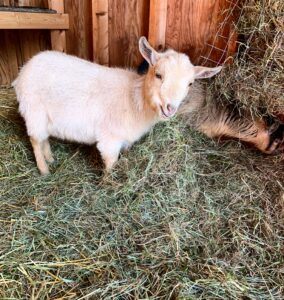
Goats digest food much differently than a human, dog, or cat. This is because they are ruminant animals meaning that they have a four chamber stomach. These different compartments are called the reticulum, rumen, omasum and abomasum, or true stomach.
Goats are able to eat foods like grass, hay, leaves, and other foraged finds because of the way that their stomachs work. The food first travels to the reticulum and the rumen which forms a large fermentation vat. Here the food is met by microorganisms, mosty bacteria, that works to ferment and break down the fibrous materials in their diet. Some of the broken down product is absorbed through the rumen wall to create energy, while the rest of it goes on to the omasum for further digestion and then, finally, moves on to the abomasum where acidic digestion takes place. After that, the remaining materials travel to the small intestine for further enzymatic digestion and nutrient absorption.
Goats, however, are not grazers like most other ruminant animals. They prefer to browse and specifically pick out plants, leaves, weeds, and even bark off trees that will be highly nutricious for them.
So while they are terrific weeders and brush clearers, don’t count on them to replace your lawn mower!
What food do you need to provide for your goat?
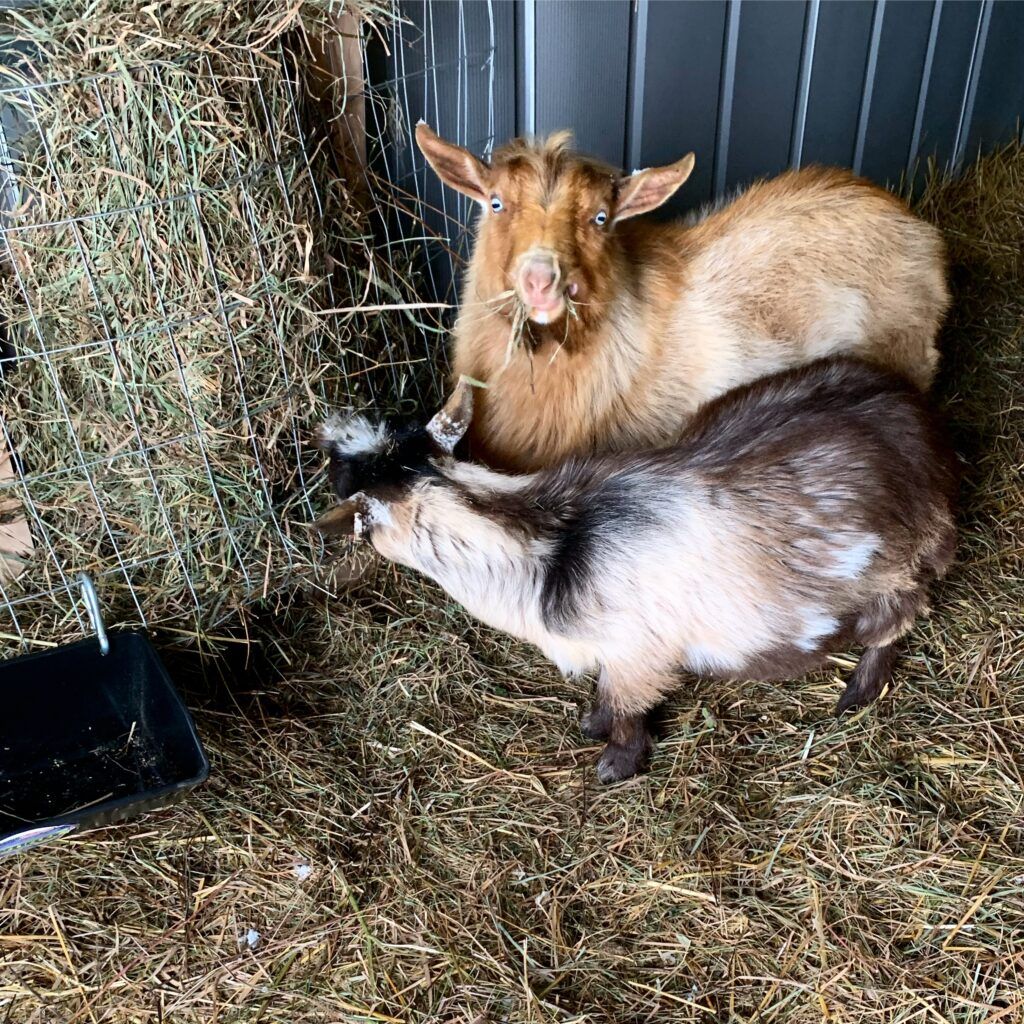
What you definitely need to have:
- HAY HAY and more HAY (and/or pasture) – 90-100% of a goats diet should be made up of hay or pasture browsing. Pasture browsing means that you have a wide open area filled with yummy grasses, weeds, and/or brush for the goats to munch on at their leisure. When my goats are out on pasture during the warmer months, they hardly touch their hay, because they are getting plenty of foraged finds in the pasture. However, I still provide hay for them free choice, even in the warmer months, in case they need something a little more rough and fibrous than my pasture can provide. During the winter months, especially when there is snow on the ground or the ground has froze, they go through hay like nobody’s business. I usually have to fill the hay rack twice a day with a few flakes of hay.
– Hay is different than straw. Straw is the yellow dried up stuff you put on your front porch during the fall to look pretty. This can be used as bedding, but it is not a good source of food. Hay is rich green grasses that were cut from a field, such as timothy grass, Bermuda grass, alfalfa grass, orchard grass etc.
– There is different cuts of hay. Typically there is 1st cut hay, 2nd cut hay, and 3rd cut hay.
1st cut is what is sounds like. It’s the first time the field is cut for the year. It has thicker stems, more weeds, and more fiber. More fiber means less proteins and fats. Some goats love 1st cutting and others prefer 2nd. You may have to do some experimenting here! 1st cutting can be better for animals that may need to lose a bit of weight.
2nd cut hay is leafer, a little thinner stems which makes is a bit softer, and a little bit more nutrient dense, but still good fiber content. I like 2nd cutting the best for my goats, and I’d say that they agree!
3rd cut hay is suuuper soft and leafy. While it looks and smells really nice, I don’t recommend third cutting as much for goats because it is very rich and nutrient dense with not a whole lot of fiber. This can cause some weight gain, especially in animals that are prone to over eating. If you have an animal that needs to gain weight however, it can be a good option, but I would still mix it in with a different cut of hay so they are getting that much needed fiber as well.
- Grain – Grain isn’t really neccessary and in some cases actually shouldnt be fed, but it can be helpful for young growing goats, pregnant or lactating goats, or bucks that are in rut and breeding with does. Grain helps give an extra protein boost and provides some extra vitamins and minerals when goats need it the most. Too much grain can be harmful though. It should not make up more than 10% of your goats diet.
* Currently my does get about 1/2 cup a day of grain and 1/2 cup a day of alfalfa pellets (I just mix them together)
* My bucks get 1/2 cup a day of grain mixed with alfalfa pellets. (They are young and will be breeding soon)
Here is a link to a good choice in grain for goats.
- Alfalfa Pellets – Alfalfa is a very good source of calcium for your goats. Which is amazing for milk production. However, too much calcium can sometimes be a cause of urinary calculi in goats.(especially males) Too much phosphorous can also cause this problem and is actually more likely to cause urinary calculi than too much calcium! Grain is high in phosphorous, so mixing your goat’s grain with alfalfa pellets is a really good way to keep your calcium to phosphorous ratios in the sweet spot, which is a ratio of 2:1.
Here is a link to organic and non GMO alfalfa pellets.
- Minerals – Goats need a variety of minerals in their diet to keep them healthy and feeling great. Mineral deficiencies in goats is a serious matter and should not be taken lightly.
* All of my goats get free choice Manna Pro minerals (purchase here) – Free Choice means available to them at all times.
* About every 6 months (or more if needed) I give my goats a copper bolus to keep them from becoming copper deficient.
* Every 30 days I give my goats some selenium and vit E. paste.
- Baking Soda – Baking soda should be given free choice to goats as well. A goat will eat baking soda when his or her tummy is upset. It helps with digestion issues and can prevent bloat.
Some other things your goats will enjoy that are healthy for them too:
- Black Oil Sunflower Seeds – This is not something that you have to give to your goats, but they love them and it can be very good for them too. Black oil sunflower seeds contain vitamin E, zinc, iron, and selenium and also add fiber and fat to the diet. It is very good for their coats, making them smooth and shiny, and it is especially good for pregnant or lactating does because of it’s ability to increase the butter-fat content in their milk!
– If you are feeding soley to add extra vitamins and minerals to their diet and improve the shine in their coat, stick to about 1/4 cup per day per goat. However, if you need to help a goat gain weight or improve milk production, you can feed up to 1 cup more per day for those purposes.
* I give about 1/4 cup per day per goat currently.
- Kelp – Kelp is an excellent source of iodine which helps regulate your goats metabolism.
* I like to feed Kelp free choice seems it is a mineral. The goats love it, and finish it off quickly.
- Healthy Treats – You can give goats carrots, greens, raisins, apples, banana slices, pumpkin, pumkin seeds, celery, water melon, and more! They will absolutley love you for it too.
* Be sure to cut into small enough pieces to avoid choking!
Non – Healthy treats:
These treats should obviously be fed in moderation. Yes, your goat will love it, but our goal here is healthy goats!! 😉
- Organic animal crackers – I don’t usually do any more than a few per week per goat. I have linked organic ones from Trader Joes that my girls love!
- Cheerios – I have only done one little handful ever for my does.
Remember, these are things that are not really benefitting our goats. It is like giving a child a cookie, and if you give a child too many cookies, not only will it wreak havoc on their bodies and health, but they will lose interest in the GOOD stuff and will beg for the BAD!!
So do a few here and there if you’d like, or better yet, avoid them completely and stick to the healthy snacks. ☺️
Are there any poisonous plants my goats should avoid?
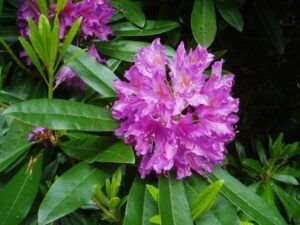
Actually, yes. There are some plants that can be poisonous for a goat. Luckily, goats are naturally pretty clever at knowing what plants are not good for them to eat, so usually, you have no need to worry. However, plant poisoning does happen, so here is a great list for you to study and learn what plants you should help your goat avoid, and what plants are A-OK.
Do you have other treats or minerals that you feed your goats? I would love to hear about it!
Let me know in the comments below. 😊
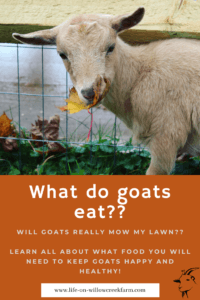
– Save this information for later, and help us spread the word by pinning this post to Pinterest!
Hover over or tap the photo on the left to see the Pin it option.
We think every farm and/or homestead should have Nigerian Dwarf goats… In fact, we think they make wonderful pets even if you DON’T have a farm!!
Want to know why?
How about we give you SEVEN reasons why…. right in THIS POST. Check it out! 😉
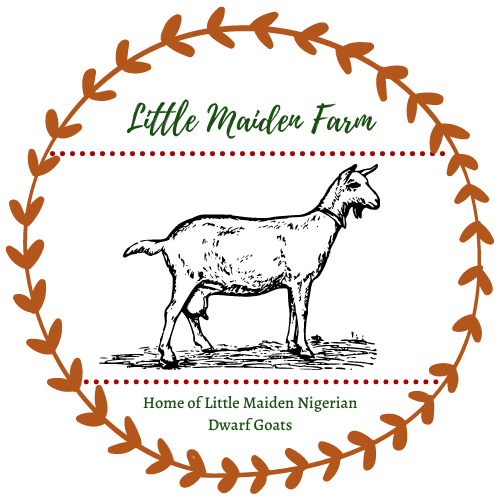
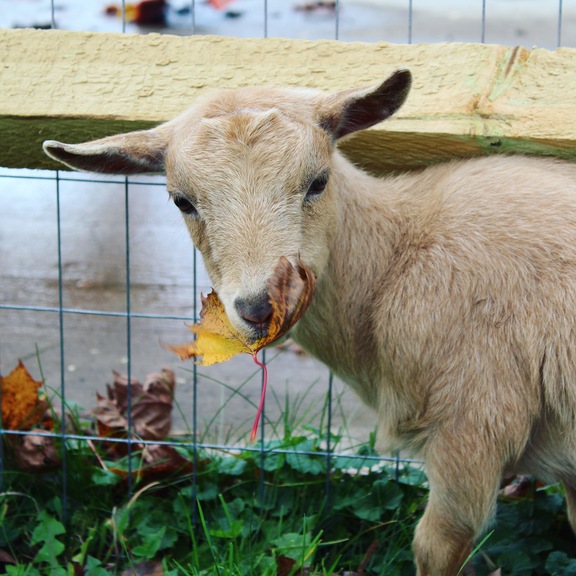


Wow, I feel like I just took a mini-course in goat care! 🙂
There’s a lot of information here, and having raised goats for a while myself (years ago, lol), this would have been an invaluable resource for me.
Thank you for putting this together 🙂
Aw thanks! I am glad that you found the information valuable. 🙂
Being a born and raised country guy I can tell you goats are not picky eaters at all, I did find it interesting what you are supposed to feed goats from your article. You might be surprised what a goat will eat, I have seen them eating old car tires and even chewing on old shoes. They are not really eating those nasty things, they just love to chew on anything they can get hold of.
So are you a country farm girl,
Jeff
Oh yes, they certainly enjoy chewing on my coat, boots, hat, gloves, anything they can get their little mouths on every time I am outside with them!
I grew up in the country surrounded by farms, but we did not have a farm ourselves. It was a dream of mine to have one someday, so I am trying now to live out that dream. 🙂
Hi Sarae, this is a very leaned site that offered me the opportunity to learn a lot about goats. Very well done, very nice. I left wrote you a letter. I like to keep my comments a bit more personal.
Lots of Love
Audrey j.
Thank you Audrey for your input! Much appreciated. 🙂
I never knew that so much thought was needed when feeding goats. My presumption was that they were grazers and would eat almost anything, due to their different digestive system. Can I ask you – is this a similar digestive system to cows?
Yes! Both cattle and goats are ruminant animals, and digest their food in very similar manners. Both of them have four stomach compartments rather than one, and when they have filled their bellies they will choose an area to rest and “chew their cud.” Which is when they regurgitate partially digested food from their first stomach chamber and give it another chewing before swelling again. 😉 However, cows are grazers, and goats are browsers. So cows will graze grass all day long, whereas goats prefer things like weeds and leaves, and even bark!
Hi Sarae,
I had to return and learn more about these Nigerian Dwarf Goats. I like to call them “goatie kids”, cause that is the pet name my granny use to use on her “goaties”-LOL. When I was a kid myself, naaaa lol, my grandma told me goats had more than one stomach chamber, and this made me think, “Why didn’t God give us humans more stomach chambers so we could eat hay, leaves, grass etc.. If the people in the world were able to get major nutrition form eating raw grass and weeds and such, there would probably be less starvation. Anyway, I want you to know that I really enjoyed your site very much. It is a great site with a great layout.
Lots of Love to you and yours.
Audrey J.
Aw I call them Goaties as well!!! 🙂 It is a wonder sometimes why we’re all created so differently.
Thank you for your kind words and for stopping by!
Great article. I live in the countryside so have come across a fair few goats in my time. a very informative article congrats.
Thank you!